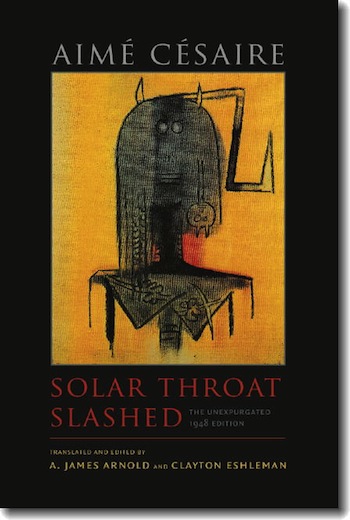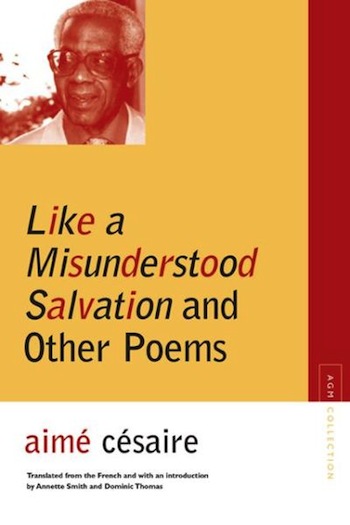Poetry Review: Rediscovering Aimé Césaire — The Politics and Poetics of Negritude.
Valuable new translations of Aimé Césaire suggest that we have overemphasized the political dimension of his poetry and overlooked other, purely literary, qualities.
The Original 1939 “Notebook of a Return to the Native Land”, by Aimé Césaire, bilingual edition, translated by A. James Arnold and Clayton Eshleman, Wesleyan University Press, 100 pp., $24.95 (cloth).
Solar Throat Slashed : The Unexpurgated 1948 Edition, by Aimé Césaire, bilingual edition, translated by A. James Arnold and Clayton Eshleman, Wesleyan University Press, 185 pp., $26.95 (cloth).
Like a Misunderstood Salvation and Other Poems, by Aimé Césaire, translated by Annette Smith and Dominic Thomas, Northwestern University Press, 104 pp., $18.95 (paper).
Return to My Native Land, by Aimé Césaire, translated by John Berger and Anna Bostock, Archipelago Books, 74 pp., $16 (paper).

French poet Aimé Césaire — new translations raise issues about just how political a poet he was.
By John Taylor
An invigorating revival of interest in Aimé Césaire (1913-2008) is taking place in the United States because of four new translations. This is not just a matter of making older work available again. The critical stakes are high. Two of these translations, based on the first “unexpurgated” editions of Césaire’s most famous volumes, the Cahier d’un retour au pays natal (1939) and Soleil cou coupé (1948), invite us to read the French poet differently, namely as a poet and not essentially as a political poet or as a politician who wrote some excellent poetry. This new potential vantage point cannot help but provoke discussion, even controversy.
Indeed, it has been difficult to detach Césaire from the political aspects of his work in general and from the Negritude movement in particular; that is, to read his poems as poems without focusing exclusively on their ideas, which, moreover, were influential. After all, Césaire launched the Negritude movement in the 1930s, along with fellow poets Léopold Sédar Senghor (1906-2001) and Léon Damas (1912-1978), and he was a longtime leftwing deputy from Martinique in the French National Assembly as well as the mayor of Fort-de-France. Because we associate him so closely with racial and colonial issues and because the aforementioned first editions were not only unavailable but forgotten, we have tended to overemphasize the political dimension of his writing and overlook other, purely literary, qualities.

Two of these qualities were underscored early on by André Breton, who read the Notebook of a Return to my Native Land in its original version. The French surrealist, who was hardly apolitical, called it “the greatest lyrical movement of our times” (in an article first published in 1943 and later used as the preface to a still-unexpurgated edition of 1947). Breton’s notions of lyricism and movement reappear in all their imposing pertinence now that we can peruse A. James Arnold and Clayton Eshleman’s scrupulously edited volumes that show the extent to which Césaire later drastically modified the original editions of his books so that they would become more strictly “political.”
Yet this new perspective, proposed by the two authoritative Wesleyan University Press restorations, remains debatable. After all, it was the poet who himself determined how his books should ultimately be read. He was the one who expurgated these volumes of some of their non-political content. Arnold and Eshleman explain in detail how this occurred in 1956 when Césaire established the standard Présence Africaine edition of the Notebook, and then, in 1961, the Éditions du Seuil text of Solar Throat Slashed under the new title Cadastre (literally “Land Registry”).
The self-censorship was extensive. From Solar Throat Slashed, about “40 percent of the original poems” were deleted, according to the translators, “whereas many of the remaining titles [were] more or less severely edited to bring them into line with the political aims of the blended collection Cadastre (1961)”:
There is a fundamental shift of vision between the 1948 and 1961 editions. In order to realign his collection with a political position consonant with the immediate postcolonial period, especially with regard to African independence, Césaire simply dropped the great majority of the poems that are permeated by magical, religious, and sexual imagery. The prophetic stance of the poetic “I” in 1948 is minimized through the same process and replaced with a more politically committed posture. The self-censorship that presided over the revision of Soleil cou coupé can be found in the post-1956 editions of all the major poetic texts written in the 1940s.
Furthermore, as Arnold and Eshleman observe, “Césaire’s practice of free associative metaphor (métaphore filée), which is most often identified with surrealist poetry, was minimized by cutting single lines and long passages of poems that in 1961 take on a character quite different from the poetics of the 1948 edition.”
Here, for example, are the opening lines of an erotic poem eliminated from the 1961 edition of Solar Throat Slashed:
A bit of light that descends the springhead of a gaze
twin shadow of the eyelash and the rainbow on a face
and round about
who goes there angelically
ambling
Woman the current weather
the current weather matters little to me
my life is always ahead of a hurricane
you are the morning that swoop down on the lamp a night stone between its teeth
you are the passage of seabirds as well
you who are the wind through the salty ipomeas of consciousness. . .
Annette Smith and Dominic Thomas, who have likewise translated the poems deleted from Solar Throat Slashed in their scholarly, though monolingual, Northwestern University Press volume Like a Misunderstood Salvation and Other Poems, offer a somewhat different slant on why Césaire suppressed the poems:

The general opinion is that Césaire’s original decision was motivated by a desire to purge the original collection of local or political references and concentrate instead on more universal content, while moderating the surrealistic style in favor of a more classical one.
The point about Césaire’s dropping political references is puzzling here, but the Smith-Thomas introduction is otherwise stimulating and engages with subject matter not always dealt with in Arnold and Eshleman’s equally thoughtful and erudite presentation. Smith and Thomas are particularly strong when analyzing Césaire’s themes of violence and torture. In regard to the prevalent imagery of the latter topic, notably in the poems “Lynch 1,” in which the poet exclaims “O lynch lovable companion,” and in “Night Crossing,” where “farmers . . . regale [him] with hatred painted on their faces,” they perspicaciously associate the poet with Jean Genet:
Masochism perhaps, but more interestingly the literary espousing of one’s indignities so as to cheat the torturer (jailer, executioner, colonial master. . .) from the power to objectify his victim. All readers of Jean Genet will recognize here a device that his characters recur to systematically in order to escape alienation.
The translators also delve into Césaire’s frequent allusions to women, into Negritude as opposed to the philosophy of Créolité formulated by the younger writers Jean Bernabé, Patrick Chamoiseau, and Raphaël Confiant (who respectfully but firmly attacked Césaire’s Afrocentrism in the 1990s), and into his multilayered poetic language.
One of the salient traits of Césaire’s diction is the botanical precision he brings to evoking the lush vegetation of the Caribbean or, in other instances, perhaps an idealized Africa. In “Laisser-Passer,” for instance, the poet depicts a marsh containing droseras (sundews). Here are the opening lines in Smith and Thomas’s rendering:
belly marsh
in a contented gunk gooey droseras listening in their lips to what
fraternal news
their days are indispensable on this world entangled in too many smokes
from breaths that mask the storm’s peppery spiritLean lean over the abyss over the vertigo
lean lean over the void
lean over the fire
A digression is necessary here. Comparing the preceding to the Arnold-Eshleman version of this same poem reveals that the latters’ rendering of the lines “. . .d’un marais au ventre brun / gluants droseras d’une gadoue heureuse” is superior (the English word “sundews” is preferable to “droseras”, while “sticky” is the appropriately less slangy equivalent of “gluants,” as opposed to “gooey”); yet Smith and Thomas more logically interpret the somewhat ambiguous “sur” in the lines “penche pense sur l’abîme sur le vertige / penche penche sur le néant / penche penche sur l’incendie” as “over” and thereby offer a more vivid version of the last three lines. Here is the Arnold-Eshleman rendering:
brown-bellied marsh
sticky sundews of a happy muck listening in their lips what fraternal news
their days are de rigueur in this world knotted by too much smoky breath
masking the peppery verve of the stormLean lean on the abyss on vertigo
lean lean on nothingness
lean lean on conflagration
Besides his love for the natural sciences, Césaire’s debt to French surrealism can be seen in the exuberant synesthesia of the above passage. While underscoring this influence, Smith and Thomas also argue for his “classicism,” thereby supplying a useful corrective to any critical view that might overemphasize the poet’s fundamental surrealist impetus, which he toned down in his expurgated definitive editions. For Césaire, style is a very intricate matter. As a student, he mastered Latin. The long-term impact of closely examining, translating, and composing Latin sentences throughout his schooling surely affected his French—which was also informed by Creole, of course. (I have written elsewhere about how Césaire’s contemporary Julien Gracq [1910-2007], who was also associated with the surrealists and equally championed by André Breton, acknowledged his debt to Latin syntax for his own famously mellifluous style. Gracq claimed that the study of Latin might well have influenced the French penchant for aphorisms.) As Smith and Thomas describe the style of Like a Misunderstood Salvation, the poet’s final collection (1994), they note both the inventiveness of Césaire’s style and the nourishment it received from Latin:

The collection Like a Misunderstood Salvation, whose lack of punctuation appropriately suggests inscriptions on Roman funerary steles, shows the semiotic and syntactical oddities characteristic of Césaire’s poetics: recurring neologisms (. . .), shifting grammatical categories, intransitive verbs used transitively, the creation of strange pronominal ones, nouns becoming adjectives or verbs, and so forth. Here again, Latin lends a few of its grammatical constructions in the form of absolute ablatives and complex word ordering.
They also recall that Césaire allowed the thirty-one poems deleted from Solar Throat Slashed to be republished, in 1994, as an appendix to his anthology Aimé Césaire: La poésie. So he later undid his self-censorship, as it were, even if he relegated the formerly suppressed poems to an appendix. Be this as it may, here is the suppressed poem “A Few Miles from the Surface”:
The tip of the cone of shade on our Brazil cheeks
during the solar eclipses
so blissfully joyous as in the long mating
of a tree and a sailboat
in the vestibule of a category-one cyclone
Woman
give me your eagle eyes
your glorious bird eyes
your eyes of an incendiary bird leader of souls
and how I relish in the blood of disaster running
in the veins of a ten-story house at the sublime minute
before its collapse at exactly three o’clock in the afternoon.
Here, in contrast, is the Arnold-Eshleman version of the same poem, which they title “Several Miles from the Surface”:
The tip of the cone of shadow on our Brazilian cheeks
in the eclipses of the sun
laughing so with happiness like the long coitus
of a tree with a sailboat
in the hall of a cyclone of the first order
Woman
give me your eagle eyes
your glorious bird eyes
your incendiary bird and soul conductor eyes
and how I do love the circulation of the blood of disaster
in the veins of a ten-storied house at the sublime moment preceding
its collapse at the stroke of 3 P.M.
The latter version strikes me as smoother. In fact, this is my overall impression after comparing all the respective translations of the deleted poems of Solar Throat Slashed. But there are striking exceptions that should encourage the Césaire enthusiast to procure both books. For instance, the first words of the opening sentence of the prose poem “Solid”—Césaire often writes poetic prose, poetry that “falls into prose” (as Nerval put it) or, inversely, prose that “falls” into poetry—seems more vigorous in the Smith-Thomas version, even if the possessive “gardens’ statues” for “les statues des jardins” is clumsy and the definite article “les” of “les amours perverses” is erroneously absent in English:
Goddamn it they have secured the universe and everything weighs—everything—the gravity’s plumb line having settled on the facile foundation of solidity—the uranium veins the gardens’ statues perverse amours the street that only feigns being fluid. . . (Smith-Thomas)
holy shit they insured the universe and everything weighs—everything—the plumb line of gravity having been installed at the facile bottom of solidity—the uranium deposits the garden statues the perverse lovers the street that merely pretends to be fluid. . . (Arnold-Esheman)
And the French behind the “goddamn it” and “holy shit” here? It is “cré nom de Dieu,” a rather archaic expletive usually written as “crénom de Dieu,” where the “cré” is derived from “sacré.” Césaire’s vocabulary contains a relatively large number of conspicuously archaic and arcane words. Both lexically and syntactically, his French is so thorny in spots that there is room for still other attempts to translate him—and the difficulties are countless. If the Wesleyan volume is superior to the Northwestern volume because it is bilingual and includes all of Solar Throat Slashed, the Northwestern edition offers the twenty-two poems of Like a Misunderstood Salvation. From that series, “Course” sums up Césaire’s own life’s course in a way that also typically seems to refer, at least now and then, to his fellow Caribbeans arriving as slaves from Africa:
with my strict saliva I kept the blood flowing
so it would not waste in oblivious squamae
on uncertain seas I rode
the dolphin of memory
heedless of everything
except for recording the reef
duly logging the landmark
for the wrecking of gods I reinvented words
wherever I landed I ploughed the fallow
dug the furrow fashioned the talus
here and there poking o hope
white tip after white tip
the humble dubbing of your bitter burgeon
The fourth and last book involved in this revival is John Berger and Ana Bostock’s co-translation of the Notebook, whose English title is misleadingly truncated to Return to My Native Land in the monolingual Archipelago Books edition. The Notebook is a laboratory of stylistic and intellectual experimentation and its “notebook” aspect is essential. Basing their version (which was first published in 1969) on the Présence Africaine edition of 1956, the translators claim that “the poem is important because of its thinking content. The thinking is both political and poetic. (. . .) It is always in respect to this double content that we have sought and worked upon an English version.”
From a translator’s practical point of view, such theoretical declarations always make me apprehensive. Comparing the Berger-Bostock version to the 1956 original confirms my fears. Beginning on the very first page (where “hannetons” is rendered as “fish-hooks”, not “cockchafers”), there are over-interpretations (“ville inerte” as “disowning town”), over-simplifications of inventive language (“the great hysterical tongue of the sea” for “la grand’lèche hystérique de la mer”, which invokes the sea’s vast and vigorous “licking”), untranslated phrases (e.g., “la plage des songes et l’insensé réveil” in an early passage), ambiguous English imagery where the French is vivid (“earth whose surfing face” for “la face houleuse” [de la terre],” in which the face of the earth is not surfing but rather consists of big stormy waves), and difficulties with Césaire’s colloquial syntax, which enables him to make robust statements.

As a simple example of this latter stylistic trait, which lies at the heart of Césaire’s poetics, consider “tout le monde la méprise la rue Paille.” In the Berger-Bostock rendering, the French becomes the straightforward “Everyone despises Paille Street,” which is an equivalent of what the poet could have written but did not write: “tout le monde méprise la rue Paille.” The Notebook displays several such colloquial twists amid high literary French. The redundant yet emotionally (and thus semantically) significant repetition of “la” makes all the difference between an ordinary remark and a forcible one: Arnold and Eshleman similarly write “Everyone despises Straw Street” for a French phrase than needs a stronger English interpretation, something like “absolutely everyone despises Straw Street” or “everybody really hates Straw Street.” In a footnote, Arnold and Eshleman point out that the straw in the street name indicates that “the poorest shacks in the colony lacked the solid roof of more prosperous houses.”
It is not just through imagery drawing from a telltale street name that a political dimension is established in the Notebook. “My mouth shall be the mouth of misfortunes which have no mouth” declares the poet, “my voice the freedom of those which break down in the prison cell of despair” (Berger-Bostock). This famous Whitman-like statement is present in the first edition as well. But Césaire’s universalizing intention initially depends on the acquisition of a personal poetic language, which itself depends on the quasi-Rilkean aspiration to learn how to name the most elemental natural objects and phenomena:
I want to rediscover the secret of great speech and of great burning. I want to say storm. I want to say river. I want to say tornado. I want to say leaf, I want to say tree. I want to be soaked by every rainfall, moistened by every dew. As frenetic blood rolls on the slow current of the eye, I want to roll words like maddened horses like new children like clotted milk like curfew like traces of a temple like precious stones buried deep enough to daunt all miners. (Berger-Bostock)
Such is the wealth of the Notebook. It tells the story of a birth into poetry as well as political commitment. And it tells this story by appealing to the deepest rudiments of nature and language. Interestingly enough, the book first began to take shape in Yugoslavia, in 1935, while Césaire was on vacation with a Croatian friend after passing the entrance exam to the École Normale Supérieure in Paris and while he was unable to return to his native Martinique. The poet thus returns to his native land through his nascent poetic and political sensibility. This personal quest, undertaken by a twenty-two-year-old student, becomes even more compelling when the first editions of his books are taken into account.
John Taylor has translated numerous French poets, most recently José-Flore Tappy (Sheds, Bitter Oleander Press) and Louis Calaferte (The Violet Blood of the Amethyst, Chelsea Editions). His new collection of essays, A Little Tour through European Poetry, has just been published by Transaction. An earlier essay, “From Césaire to Chamoiseau,” was published in the second volume of his Paths to Contemporary French Literature (Transaction, 2007). He lives in France.
Tagged: A. James Arnold, Aimé Césaire, Anna Bostock, Annette Smith, Archipelago-Books, Clayton Eshleman, Dominic Thomas, French poetry, John Berger, Like a Misunderstood Salvation and Other Poems, Martinique, Negritude, Northwestern University Press, Return to My Native Land, Solar Throat Slashed, Solar Throat Slashed : The Unexpurgated 1948 Edition, The Original 1939 “Notebook of a Return to the Native Land”, translation
